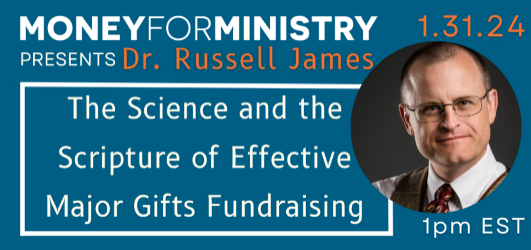10 Tips from Russell James

Russell James recently led a webinar with our sister company, Money for Ministry. While the webinar was aimed at faith-based nonprofits, here are some valuable takeaways for any fundraisers who want to grow their organizations!
1. There’s a difference between giving from wealth and giving from income. The first time most people ever commit to a gift from their wealth (not their income) is in their estate plan.
2. There’s a difference between giving down (think of the old pity-based “giving alms”) and sharing with the community. If you are begging for donations, you are doing it wrong.
3. Ordinary fundraising is about asking the donor to give up their money. Planned giving is about asking the donor to enjoy their wealth.
4. Donors can do four things with their wealth. They can overspend and consume it all. They can stash it away and then lose it when they die. They can keep working and hustling to get more and still lose it when they die. Or they can enjoy it while they are alive. The one thing they can’t do is take it with them. Have confidence in asking, because you know that the enjoyment of sharing is a better outcome.
5. Gifts from wealth sustain organizations. In one study of nonprofits that raised over $1 million, those that only receive cash gifts experienced 11% growth over 5 years. Those that received securities and other non-cash gifts experienced 66% growth in that time.
6. Once people add a charitable organization into their estate plan, their annual gifts tended to spike 77%. Bringing them into your legacy fold will have great benefits now.
7. Emphasize the donors’ action and impact, not just what your nonprofit does. Ask donors to do things that happen to cost money, don’t just ask for money. Does your language offer them the chance to do something good?
8. Donors want to know: What happens if I make a gift? What will I change? Help them feel like they are “one of us.”
9. Enhance the donor’s connection to the community by asking them to share with fellow community members. Offer them a superior life experience rather than just increasing the dollar value of the nonprofit.
10. A lesson for fundraisers from the sales world: “To win larger, consultative deals, salespeople must abandon traditional sales techniques. Rather than twisting their customers’ arms, they need to build value, identify needs, and, ultimately, serve as a trusted advisor” (from Spin Selling by Neil Rackham).
